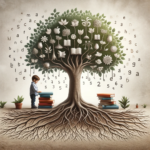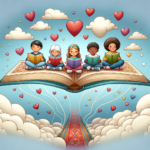Benefits of Reading to Children for their Development
Abstract
In the comprehensive exploration "Importance of Reading in Child Development," we delve into the multifaceted role of reading in shaping the early years of a child's life. This document illuminates the benefits of reading to children, showcasing how it fosters cognitive growth, such as language acquisition and literacy skills, and significantly enriches emotional and social development. From building empathy and creativity to strengthening parent-child bonds and social understanding, the document underscores the profound, long-term benefits of early reading. Through a blend of research, analysis, and practical insights, it advocates for embedding reading into the fabric of early childhood, laying a foundation for lifelong learning and personal growth.
Introduction
The journey of a child’s growth is profoundly influenced by the experiences they encounter in their early years, with one of the most impactful being the exposure to reading. "Importance of Reading in Child Development" delves into the crucial role that reading plays in shaping a child's cognitive, emotional, and social development. This extensive exploration provides a nuanced understanding of the benefits of reading to children, particularly how reading stories before the age of five cultivates foundational literacy skills, fosters emotional intelligence, and strengthens social bonds. Drawing upon a rich tapestry of scientific studies and practical observations, this document offers an enlightening perspective on why reading is not just an educational tool, but a vital component in nurturing well-rounded, intellectually curious, and empathetic individuals. As we embark on this journey, we invite readers to uncover the transformative power of reading in the tapestry of child development, a power that resonates far beyond the early years and into the heart of lifelong learning and personal growth.
Unlocking Potential: The Power of Reading in Enhancing Cognitive Development in Children

In the journey of childhood development, the benefits of reading to children play a pivotal role, particularly in nurturing cognitive growth. At HorizonLecture, we believe that the magic of words and stories not only entertains but also significantly contributes to a child’s cognitive development. This includes key areas such as language acquisition, literacy skills, and the enhancement of fundamental cognitive functions like memory, attention, and critical thinking.
Language Acquisition and Literacy Skills
The first cornerstone of cognitive development influenced by reading is language acquisition. From a tender age, children begin to assimilate the sounds, rhythms, and structures of language. Reading aloud to children exposes them to a rich tapestry of vocabulary and syntax, far beyond the scope of everyday conversation. This exposure is one of the key benefits of reading to children, playing an essential role in language acquisition and helping them to understand and use complex language structures. As children's books often include a variety of linguistic styles and a more extensive vocabulary than spoken language, reading can significantly enhance a child's language skills. Moreover, early reading experiences lay the foundation for literacy skills. Literacy involves not just the ability to read but to comprehend, interpret, and critically engage with text. By introducing children to reading at an early age, we facilitate their ability to decode symbols (letters and words), understand meanings, and eventually, enable them to start reading independently. This skill is crucial not just for academic success, but for lifelong learning and navigating the world around them.
Enhancing Cognitive Skills: Memory, Attention, and Critical Thinking
Beyond language and literacy, reading has a profound impact on other cognitive skills. One such area is memory. Reading encourages children to remember characters, plots, and the information they read, thereby enhancing both short-term and long-term memory. As children relate the stories to their own experiences or learn to anticipate narrative structures, they develop stronger memory pathways. Attention is another cognitive skill honed by reading. The act of following a narrative requires sustained concentration. In our world of constant digital distractions, the focused attention demanded by reading becomes an invaluable skill for children. It trains them to concentrate on a task for extended periods, an ability that is beneficial in all areas of learning and life. Furthermore, reading is instrumental in developing critical thinking skills. As children engage with various narratives, they learn to understand cause and effect, make predictions, and draw conclusions. They begin to empathize with characters, consider different perspectives, and question the material they read. This not only enhances their comprehension skills but also encourages them to think critically and creatively about the world around them.
Key Takeaways
At HorizonLecture, we recognize that one of the vital benefits of reading to children is that it’s more than just a pastime. It is a vital tool in a child’s cognitive development, shaping their language, literacy, memory, attention, and critical thinking skills. By fostering a love of reading, we are not just entertaining young minds; we are equipping them with essential skills for their academic journey and beyond.
Nurturing Hearts and Minds: The Role of Reading in Emotional and Social Development

At HorizonLecture, we champion the benefits of reading to children, acknowledging its profound impact on not just cognitive but also emotional and social development. Books are not merely vessels of stories and information; they are mirrors and windows into the soul, helping children to understand themselves and the world around them. In this context, reading plays a crucial role in building empathy and understanding, enhancing creativity and imagination, and developing self-identity and confidence.
Building Empathy and Understanding
One of the most significant benefits of reading to children is the development of empathy, a cornerstone of emotional intelligence. Through stories, children are transported into different worlds and perspectives. They encounter characters from various backgrounds and experiences, allowing them to step into someone else's shoes. This experience teaches them to understand and share the feelings of others. It broadens their view and fosters a sense of empathy, which is fundamental in developing strong, compassionate social relationships. Moreover, reading about diverse characters and cultures helps children develop a sense of understanding and tolerance. They learn to appreciate differences and find common ground with others, which is essential in our increasingly globalized world.
Enhancing Creativity and Imagination
Reading also plays a pivotal role in enhancing a child's creativity and imagination. Stories open doors to new worlds, possibilities, and ideas. They stretch the boundaries of what is real and possible, encouraging children to imagine, dream, and create. This stimulation of the imagination is not just a source of joy and entertainment; it is a crucial element in creative thinking and problem-solving. It enables children to think outside the box, come up with innovative solutions, and view challenges from different angles. In a world that is rapidly changing and where creativity is highly valued, nurturing this ability from a young age is vital. Through reading, children develop a creative mindset that will benefit them throughout their lives, both personally and professionally.
Developing Self-Identity and Confidence
Another crucial aspect of emotional and social development facilitated by reading is the formation of a strong self-identity and confidence. A crucial benefit of reading to children is providing a source of validation and understanding, which aids in developing self-identity and confidence. Seeing characters they can relate to – who face similar challenges, experiences, and emotions – can be incredibly affirming. It helps children understand that their feelings and experiences are valid and normal. Furthermore, as children read and understand more about the world and other people, they become more confident in their own knowledge and abilities. The act of reading itself, as children progress and become more proficient, also builds self-esteem. They gain a sense of accomplishment and independence, reinforcing their self-confidence.
Key Takeaways
Thus, the benefits of reading to children are a powerful tool, shaping intellect, heart, and character in a child’s formative years. At HorizonLecture, we are committed to fostering this holistic development. Through the stories we recommend and the reading experiences we create, we aim to help children develop empathy, creativity, self-identity, and confidence, preparing them not just for academic success but for life.
Strengthening Bonds and Social Understanding: The Impact of Reading on Parent-Child Relationships and Social Skills

At HorizonLecture, we are deeply aware of the multifaceted benefits of reading, extending beyond cognitive and emotional development to encompass the nurturing of relationships and social skills. Reading, particularly in the context of parent-child interaction, is a powerful tool in strengthening familial bonds and teaching children about social interactions and norms.
Fostering Parent-Child Bonding through Shared Reading Experiences
Among the benefits of reading to children, one of the most heartwarming is the opportunity it creates for bonding during shared reading experiences. Shared reading experiences are not just educational but are imbued with affection, attention, and mutual enjoyment. These moments of closeness, as parents and children explore stories together, lay the foundation for a strong, trusting relationship. Reading together allows parents and children to share thoughts, feelings, and insights, creating a space for meaningful conversations and emotional connection. This bonding experience also provides a sense of security and comfort for the child. The routine of a bedtime story or regular reading sessions becomes a cherished, safe time, reinforcing the child's sense of love and belonging. For parents, these moments are equally rewarding, offering a unique opportunity to engage with their child's world, understand their thoughts, and guide their emotional and intellectual growth.
Enhancing Understanding of Social Interactions and Norms
Beyond strengthening familial bonds, reading plays a crucial role in helping children navigate the complexities of social interactions and norms. Through stories, children are exposed to various social scenarios and characters. They observe interactions, conflicts, resolutions, and a wide range of emotions and responses. This exposure is invaluable in teaching children about the nuances of social behavior, empathy, and understanding others' perspectives. Children learn through stories how characters navigate friendships, family dynamics, and challenges. They see examples of good behavior, kindness, and cooperation, as well as the consequences of negative actions. This learning is often more impactful than direct teaching because it is presented in a relatable and engaging narrative form. Stories provide a safe space for children to explore and understand social dynamics without the pressures of real-life situations. Moreover, reading about diverse characters and cultures aids in developing an appreciation for diversity and inclusivity. Children learn that while people may look different or come from various backgrounds, common values and emotions unite us. This understanding is crucial in developing social skills that are inclusive and respectful of differences.
Key Takeaways
In conclusion, reading is a powerful tool in the development of strong parent-child relationships and the acquisition of essential social skills. At HorizonLecture, we advocate for incorporating reading into family routines not only for its educational benefits but for its ability to connect hearts, minds, and worlds. Through our recommendations and resources, we aim to support parents in this journey, helping to nurture a generation that is not only intellectually curious but also emotionally intelligent and socially adept.
Laying Foundations for the Future: The Long-Term Academic and Life Benefits of Reading

At HorizonLecture, we emphasize not only the immediate joys and learning experiences that reading brings to children but also its significant long-term benefits. Reading is an investment in a child’s future, laying the groundwork for academic success and instilling a lifelong passion for learning and books.
The Correlation Between Reading and Academic Success
The connection between regular reading and academic achievement is well-documented and profound. Reading from an early age significantly enhances a child’s language skills, which are fundamental to most learning areas. Children who are exposed to a wide range of texts develop a broader vocabulary, better comprehension skills, and a greater ability to express themselves. These skills are critical not only for language arts but across all academic disciplines. Reading enhances a child’s ability to understand and process information, follow arguments, and engage with complex ideas, which are vital skills in subjects like science, history, and mathematics. Furthermore, the discipline and concentration developed through regular reading are invaluable for academic success. Children who read often are more likely to develop the ability to concentrate for longer periods, a skill that is crucial in a classroom setting and for independent study. The critical thinking skills nurtured by engaging with diverse narratives and information also translate into better problem-solving abilities in various academic contexts.
Fostering a Lifelong Love for Learning and Books
Beyond academic performance, fostering a lifelong love for learning and books stands out as one of the most significant long-term benefits of reading to children. Reading opens a world of imagination, curiosity, and knowledge for children. It exposes them to new ideas, cultures, and perspectives, sparking their curiosity and desire to learn more. This innate love and enthusiasm for learning are what drives personal and professional growth throughout life. A child who loves to read becomes an adult who seeks knowledge, is open to new ideas, and engages with the world in a thoughtful, informed manner. This love for learning is not confined to academic success; it permeates all aspects of life, encouraging continuous personal development, empathy, and understanding of others. Moreover, a lifelong relationship with books is a source of endless joy and comfort. Books can be companions, sources of inspiration, and means of escape. They offer a way to relax and de-stress, providing a healthy outlet for emotions and a respite from the fast-paced digital world. This relationship with books and learning is a gift that enriches life in countless ways.
Key Takeaways
In essence, the impact of reading in childhood extends far beyond the early years. At HorizonLecture, we are committed to fostering this powerful tool that not only paves the way for academic excellence but also cultivates a lifelong passion for learning and books. We believe that by encouraging children to embrace the world of reading, we are equipping them with the tools for a successful, fulfilling life, both academically and personally.
Conclusion
The exploration of reading's impact in "Importance of Reading in Child Development" reaffirms the indispensable role of early literacy experiences in shaping a child’s future. This comprehensive analysis reveals the benefits of reading to children, showing that it does more than teach words; it opens doors to emotional understanding, cognitive growth, and social skills, laying a foundation for lifelong success. As parents and educators, embracing the power of stories and reading practices is pivotal in nurturing well-rounded, empathetic, and intellectually curious individuals. Ultimately, the act of reading to our children is an invaluable investment in their holistic development and a gift that echoes throughout their lives.



It is the best time to make some plans for the longer term and it is time to be happy.
I’ve read this publish and if I could I wish to counsel you some interesting
issues or tips. Maybe you can write subsequent articles
regarding this article. I want to learn more issues approximately it!
Thank you Don for your thoughtful comment and suggestions! I’m glad you found the article informative and are interested in exploring more topics around it. I’m open to considering new ideas if they are relevant and valuable to our readers. If you have specific topics or questions in mind related to child development and reading, feel free to share them!